How to rebuild a city with Karam Alkatlabe

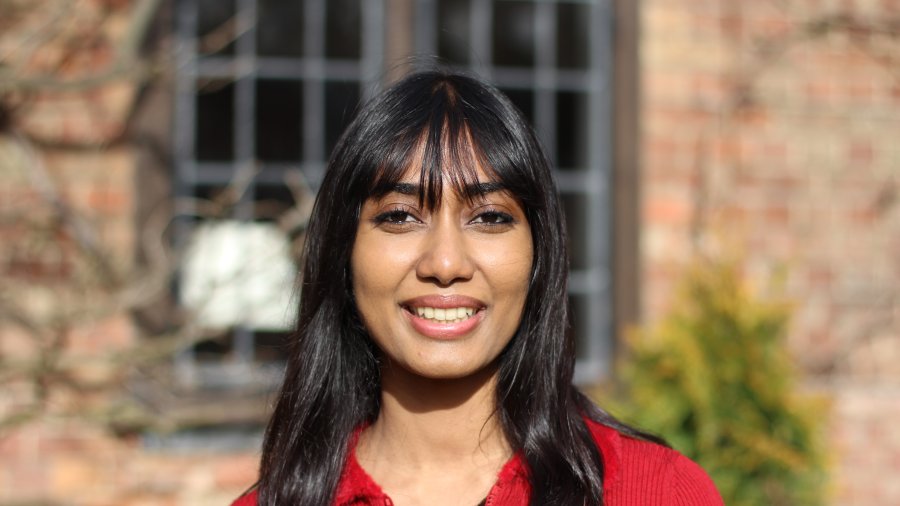
Nethra Prathap is in the first year of the Affiliated Law Tripos at Wolfson: an accelerated two-year law degree available to those who already hold an undergraduate degree.

Nethra completed her schooling in India and after taking an interdisciplinary degree in Amsterdam discovered a keen interested in international human rights law. For Nethra, interdisciplinary thinking and approaching legal studies with a global outlook has always been important. She is enjoying developing her critical thinking and debate skills as part of her Cambridge degree.
Tell me a bit about your educational journey. Did you have a career plan or dream job when you were growing up?
My educational journey began in India where I grew up and completed my schooling. Throughout my schooling, I always enjoyed learning various disciplines and it was reflected in my constantly varying ambitions. One year I was convinced that I wanted to study Maths or Physics at university and the following year I was determined that I wanted to become an artist. In my final year of school, I found the prospect of choosing just one discipline and almost abandoning my other interests extremely daunting.
Moreover, like many others, I had not gained clarity on what exactly I wanted to study. Amidst the pandemic, I moved to Amsterdam to start an interdisciplinary undergraduate degree, not expecting that my time there would be extremely transformative and lead me here to Cambridge to study Law.
How did you find studying the interdisciplinary undergraduate degree at Amsterdam University College (AUC)?
It was a very international experience, both the degree and living in Amsterdam, which made it quite easy to feel at home. The experience of moving to a completely new country alone made me more independent and confident. The interdisciplinary nature of my first undergraduate degree let me pursue social sciences modules while studying international law and comparative law of multiple jurisdictions.
The degree, the student life, and a lot of travelling during this period opened my eyes to a more global outlook. It sparked my interest in international human rights law issues and debates about secession. Currently, the human rights law paper as part of the Law Tripos is something I am finding very interesting.
You speak about discovering law in your first semester and following the law track at AUC. Was it a surprise to you to be interested in law, or were you interested in the legal system growing up?
Pursuing law was something I had never considered growing up. There were no lawyers in my family, and I had never met one. A 17-year-old me would have been shocked at the prospect of studying law at Cambridge. It was during the first year of my undergraduate degree that I fortuitously elected a module that had a small law component. I realised then that I really enjoyed studying it and I ended up pursuing the law track there.
In retrospect, I believe that my upbringing within a family that valued debating ideas not only foreshadowed but also nurtured my inclination towards studying law and a legal profession.
What was it about law that interested or excited you at that stage, then?
The logical framework of the law and its application in resolving intricate fact patterns fascinated me. It's akin to solving mathematical puzzles, yet instead of numbers, the variables are people and larger entities, each carrying nuanced complexities of human behaviour. I love observing the tangible effects of the law and how it influences human and societal activity.
You are now in your first year studying the Affiliated Law Tripos degree. How are you finding your course and the supervision system at Cambridge?
I am really enjoying studying this degree and am so grateful to be here. It has made me more passionate about the law. Of course, it is a lot of work and does get overwhelming at times. These challenges are part of the process and have helped me adapt my working style and improve my time management skills. It is both surprising and rewarding to be able to learn so much within the short duration of the 8-week terms.
The supervision system is one of my favourite things about Cambridge. It is not only invaluable in gaining greater clarity on the subjects but also often makes you think about the law more critically and gain a broader picture.
Do you have a favourite paper or area of the subject currently?
Choosing a favourite paper is almost an impossible task. Land, tort, and contract law are the ones I enjoy working on the most. I am also fascinated by the small overlaps and interconnectedness between the five distinct papers.
The approach to learning here in Cambridge is geared towards not only understanding the way the law works in depth but also engaging with the current academic debates. There is a great focus on critically engaging with everything from decisions by the courts to academic opinions.
What made you choose Wolfson and how did you find settling into university life as a mature undergraduate?
When I applied, the prospect of getting into Cambridge seemed like a distant dream, almost unattainable. All my apprehensions about fitting in disappeared within the first few days of coming here.
I chose to apply to Wolfson because it was a mature college, and it was very international. Everyone has such an interesting journey and story to tell which adds to the uniqueness of the place. It is a very friendly and welcoming place.
There are numerous avenues to socialise and meet new people, from having meals in the dining hall to bops (big organised parties). It is also a very motivating place to focus and work.
Do you have any tips for settling into undergraduate life and feeling at home as an international student?
Settling into new countries has luckily been very easy for me. I genuinely believe that most people are friendly and lovely. In fact, cultural differences are often nice variations in friendships. I think being open-minded, optimistic, and proactive in getting involved in social and extracurricular activities always helps.
Wolfson is very international making it easy to feel at home. Of course, there may be challenges and new things to get accustomed to. For example, learning how to cook has been a great skill and simple solution in a new country.
Are you involved in anything socially or academically at Wolfson or Cambridge outside your studies?
The degree is quite demanding and does take up a lot of time. I still try to engage in other activities. Going to debates and talks at the Cambridge Union has been a great way to engage with diverse topics and people from outside the College. The Cambridge Law Society organises numerous events with barristers and law firms which has helped me start thinking about what I may like to do after the degree.
It’s also fun exploring other colleges and the different libraries in the city. Playing pool in the clubroom has additionally been a relaxing and social break from work. I have made slow progress at it, but I do think I have improved!
Overall, I am very grateful for the opportunities available here. Thanks to the pathway scheme, I was able to marshal at the Upper Tribunal (Immigration and Asylum). The scheme was set up by Kimberly Andrews (a Wolfson law student), Judge Keith, and a fund set up by Jane Beven. It was an extraordinary experience to interact with judges and watch the law at play.
Given the extra life experiences as a slightly older student, I think I am more grateful for the opportunities I have around me than I was when I started university right after school.
This article is part of the 2024 Undergraduate Student Profile Series.
Click through to find out more about current opportunities and support for prospective mature students, including our fully-funded virtual and residential outreach programme, 21 Plus. The 21 Plus applicant support programme is run jointly by the three Mature Cambridge Colleges. Applications are now open and close on 24 April 2024 (6:00 PM UK time).
In-person tours of College are additionally available for prospective undergraduate and foundation year students. You can also discover more about applying to Cambridge as a mature student, including details about the additional UCAS deadline in March for mature students.
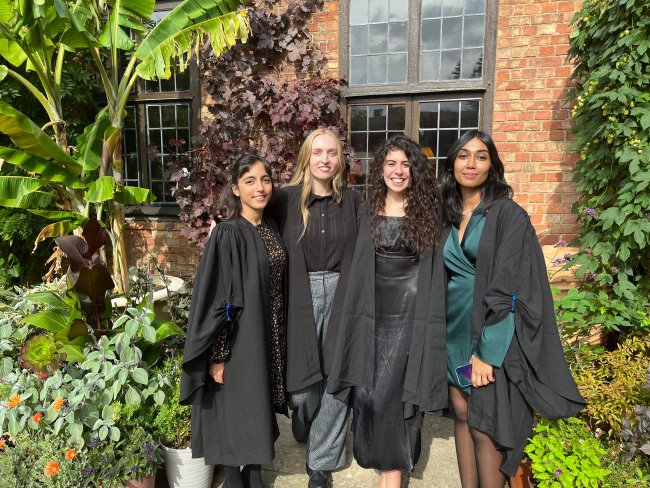
Nethra at Matriculation with new friends
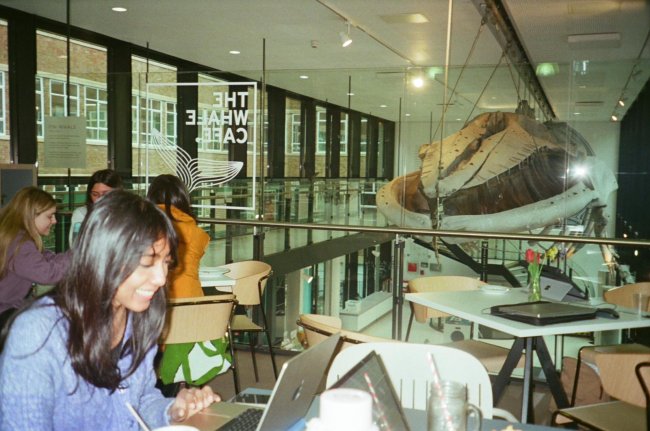
Nethra studying
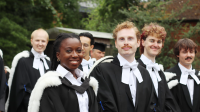
Graduation ceremonies are the culmination of students’ hard work and commitment, and a moment to celebrate the completion of their Cambridge degree.
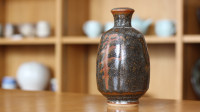
A display of works from the Bradshaw-Bubier studio pottery collection.
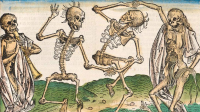
How we can develop ‘death activism’ – a variety of tactics and posthuman practices which celebrate death, its inevitability, its forms, from the slow to times of crisis, and how can trauma and mourning emerge as their own forms of expression, or even activism?
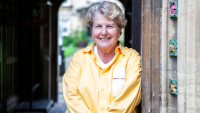
We are delighted to welcome Sandi Toksvig OBE as our speaker for Wolfson's prestigious Lee Lecture this year.

Join us for the 2024 Wolfson Research Event: an interdisciplinary academic conference organised by students to showcase the diversity of the research carried out by Wolfson students.







